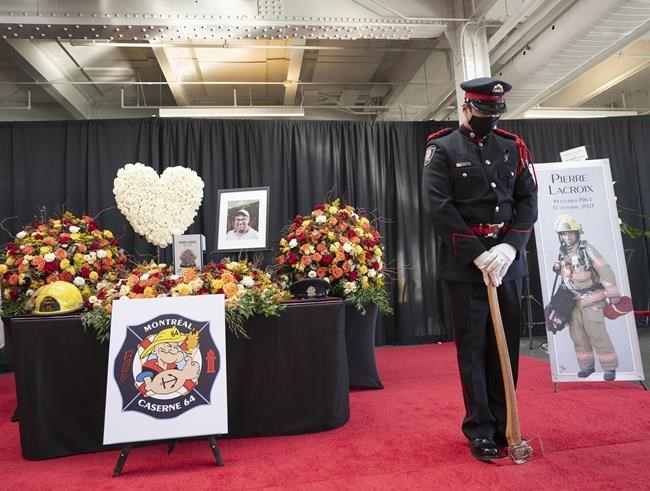MONTREAL — The coroner who investigated the 2021 drowning of a Montreal firefighter in the St. Lawrence River has concluded the members of the fire department's water rescue squad were brave but undertrained.
Pierre Lacroix, 58, was one of four firefighters who went to the aid of two pleasure boaters after their motor died and they were drifting towards the Lachine Rapids on the evening of Oct. 17, 2021.
Quebec Coroner Géhane Kamel wrote that none of the four was trained in whitewater rescues, and none of the officers at a fire department command post overseeing the operation had any nautical rescue training.
"There was one victim," Kamel wrote in the report released late Thursday. "There could have been six."
Lacroix and his colleagues were preparing to tow the pleasure boat to safety when a wave capsized their HammerHead rescue boat, throwing all four firefighters into the water. Three of them ended up under the boat.
While the other firefighters were able to get out from under the boat, Lacroix did not, and his body was found the next day.
Kamel writes that Lacroix spent his entire career — more than 30 years — at a fire station in Montreal's Lachine borough that offers nautical rescue services.
"Despite his numerous years of experience, he had no training in whitewater navigation, and his boating qualification was done in a pool," she writes. "He also had no practical training in boat towing, nor in whitewater self-rescue."
Witnesses described him as a committed firefighter, dedicated to saving lives, she wrote.
Throughout her report, Kamel noted the bravery of Lacroix and his colleagues and their commitment to saving lives, even at the risk of their own.
"On the evening of the events, even though the mission was perilous, the firefighters were determined to save the boaters. One of the firefighters told us, 'They were in front of us, we may have had tunnel vision, but we were determined to bring them back,'" she writes.
Kamel's report also highlights faults on the night of the rescue, including the use of different radio frequencies by police, the Coast Guard and the military, which contributed to a chaotic rescue operation.
She concludes Lacroix's death was accidental but says the city's fire department must provide its members with more water rescue training, including specific training on whitewater rescues and conduct training simulations with other agencies, such as the Coast Guard and city police.
Chris Ross, president of the union that represents Montreal firefighters, said the union has been calling for improvements to training for years, and it's unfortunate that it took a death to prompt change.
“As much as we're happy to have the report, I have to admit, there's a certain amount of anger and deception that we had to reach that point,” he said in an interview Friday.
Ross said the issues around insufficient training exist across the Montreal fire department, which has moved away from practical training, towards things like online courses.
“When you're talking about a fire department, you need practical live training, where you're going to get your hands dirty, and you're going to practise what you're doing," he said. "It's what makes you excel at your job." He said he’s optimistic that things will improve at the water rescue squad, but that change hasn't begun.
Kamel also recommends that the province set standards for water rescues by municipal fire departments.
Among her other recommendations, are that the city and the Coast Guard ensure that signage warning about dangers be installed in areas visible to boaters and that Transport Canada review its licensing requirements for people operating pleasure craft.
In news release, the Montreal fire department said it has set up a committee of qualified instructors to review the services offered by its nautical rescue team and the training its members receive.
“This committee will integrate the coroner’s recommendations into its considerations and proposals,” the department said, adding that it is acquiring 12 new water rescue boats, which will start going into service this year.
This report by The Canadian Press was first published April 28, 2023.
Jacob Serebrin, The Canadian Press



